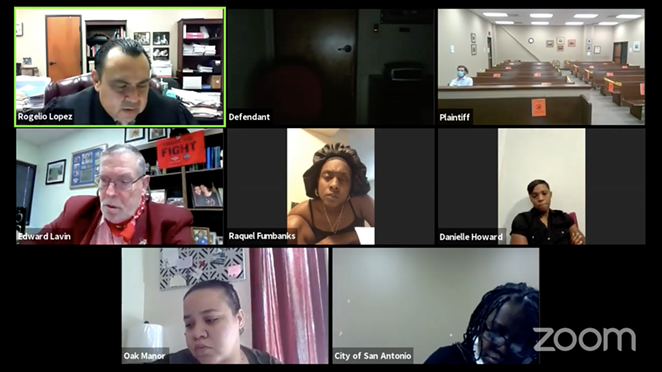How One San Antonio Courtroom Handles Tenant-Landlord Disputes During the Pandemic


- Screen Capture / Zoom
- Judge Rogelio Lopez Jr. presides over a Zoom session between landlords and tenants while his courtroom sits largely empty.
Like other Texas courts, San Antonio’s Precinct 4 Justice of the Peace has gone on Zoom.
On a recent Tuesday, Judge Rogelio Lopez Jr. presided over his Southeast Side courtroom, working to resolve disputes between landlords and tenants. However, the bailiff and I were the only people in the actual courtroom.
A large TV screen on the wall above the judge’s bench showed 10 individual streaming videos. Lawyers, landlords and tenants from across San Antonio sat waiting for the court to begin in their offices, living rooms, and in one stream, what appeared to be a bedroom.
After the bailiff swore in the plaintiffs and defendants, Lopez opened the session by reading the day’s docket. The virtual proceedings seemed to run as smoothly as could be expected under the circumstances.
“It is very difficult to do this right. The court is restricted,” Lopez said. “Due to the pandemic, restricting the court is contrary to everything I believe in.”
The hearings unfolded after a federal eviction moratorium expired last month, leaving housing advocates concerned about a potential surge in evictions. So, whether a Bexar County renter will be cast out for not paying on time is largely in the hands of judges like Lopez.
During the hearings, the judge patiently waited through technical difficulties, mysterious reverberations, the murmur of background conversations and the snap of a soda can being opened.
“Anyone who is not participating must put their sound on mute, please,” Lopez said as he strained to hear one soft-spoken complainant.
Case Backlog
Right now, Precinct 4 is only hearing 100 eviction suits a week. Before the pandemic, up to 250 evictions went through Judge Lopez’s courtroom weekly. The court currently has a backlog of some 400 cases.
When the Texas Supreme Court lifted its moratorium on evictions in May, Lopez and his staff plowed through a similar backlog in two weeks. It’s too early to tell how quickly the court will resume its regular caseload — and there’s no telling how much worse the economy will get, forcing more landlords to start eviction proceedings against tenants who miss rent.
“The city and the county have programs for rental assistance to help both landlords and tenants,” Lopez told the plaintiffs and defendants. “There are monies available that may help people resolve these matters without going through the full eviction.”
No matter what, Lopez said, he’ll continue to use Zoom instead of in-person court proceedings because of the COVID-19 threat. Under the court’s current rules, he’s only hearing evictions of tenants suspected of committing criminal activity or are accused of being an imminent threat to their neighbors.
‘A Difficult Time’
What unfolded over the next hour of hearings is typical of these proceedings: landlords, usually represented by an attorney, made their case to evict a tenant. The tenants, mostly without representation, defended themselves. More often than not, during this session, they lost.
The first plaintiffs of the day complained that their tenant’s family members threatened them with pepper spray and violence. The landlords offered a 30-day continuance on their lawsuit if the tenant agreed to resolve the problem, meaning, not allow the disruptive family members into the rental. The tenant agreed and avoided imminent eviction for at least the next month.
“Landlords realize it’s a difficult time. I think they genuinely want to work things out,” Lopez said in his chambers after the court concluded. “I always encourage the parties to work things out. Everyone benefits, because the landlord wants to get paid and the tenant wants to stay home.”
The next case didn’t fall under the Lopez’s view of an imminent threat. And though the tenant allegedly owed more than $3,000 in back rent, the judge pushed back the lawsuit to a later date when regular evictions will proceed.
Other tenants weren’t as fortunate.
One after another, the judge agreed with the plaintiffs and ordered tenants to vacate their homes in five days or appeal the decision. After he rendered the decisions, a city representative spoke up, offering information on financial and rental assistance to the defendants.
Kenny Wilson, president and CEO of the Haven for Hope shelter, expects an increase in homelessness as the pandemic and its economic consequences play out.
But, so far, he hasn’t seen evidence of mass evictions.
“The city is taking lots of steps to keep people in their home, including specialists on standby at the court hearings to help people. I hope it stays the same,” he said. “I’m a little surprised, but grateful.”
Stay on top of San Antonio news and views. Sign up for our Weekly Headlines Newsletter.
















